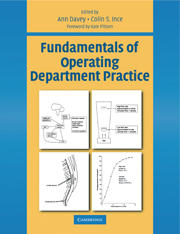Book contents
- Frontmatter
- Contents
- Contributors
- Preface
- Foreword
- Acknowledgements
- Introduction
- Chapter 1 The operating department practitioner, the patient and the law
- Chapter 2 Aspects of health and safety in the operating department
- Chapter 3 The caring practitioner
- Chapter 4 Strategies for infection control in the operating department
- Chapter 5 Sterilization, decontamination and the surgical field
- Chapter 6 The fundamentals of cardiovascular physiology
- Chapter 7 Fundamentals of respiratory physiology
- Chapter 8 Scientific principles in relation to the anaesthetic machine
- Chapter 9 Fundamentals of artificial ventilation of the lung
- Chapter 10 Scientific principles in relation to monitoring equipment
- Chapter 11 Scientific principles in relation to endoscopic, laser and radiological equipment
- Chapter 12 Pharmacological principles of drug administration
- Chapter 13 The pharmacology of drugs used in general anaesthesia
- Chapter 14 The local anaesthetic drugs - does the ideal agent exist?
- Chapter 15 The safe positioning of patients for surgery
- Chapter 16 Principles involved in the management and use of equipment
- Chapter 17 Understanding suture materials
- Chapter 18 Fundamentals ofpaediatric surgery and anaesthesia
- Chapter 19 Fundamentals of hyperthermia and hypothermia
- Chapter 20 Fundamentals of fluid and electrolyte balance during surgery
- Chapter 21 The physiology of blood and its administration
- Chapter 22 Fundamentals of pain relief
- Chapter 23 Fundamentals of dressings and drains in relation to wound healing
- Chapter 24 The recovery of patients from anaesthesia and surgery
- Chapter 25 Fundamentals of emergency and obstetric anaesthesia
- Chapter 26 Identification and management of anaesthetic emergencies
- Chapter 27 The fundamentals of emergency resuscitation
- Appendixes
- Index
Foreword
Published online by Cambridge University Press: 05 October 2015
- Frontmatter
- Contents
- Contributors
- Preface
- Foreword
- Acknowledgements
- Introduction
- Chapter 1 The operating department practitioner, the patient and the law
- Chapter 2 Aspects of health and safety in the operating department
- Chapter 3 The caring practitioner
- Chapter 4 Strategies for infection control in the operating department
- Chapter 5 Sterilization, decontamination and the surgical field
- Chapter 6 The fundamentals of cardiovascular physiology
- Chapter 7 Fundamentals of respiratory physiology
- Chapter 8 Scientific principles in relation to the anaesthetic machine
- Chapter 9 Fundamentals of artificial ventilation of the lung
- Chapter 10 Scientific principles in relation to monitoring equipment
- Chapter 11 Scientific principles in relation to endoscopic, laser and radiological equipment
- Chapter 12 Pharmacological principles of drug administration
- Chapter 13 The pharmacology of drugs used in general anaesthesia
- Chapter 14 The local anaesthetic drugs - does the ideal agent exist?
- Chapter 15 The safe positioning of patients for surgery
- Chapter 16 Principles involved in the management and use of equipment
- Chapter 17 Understanding suture materials
- Chapter 18 Fundamentals ofpaediatric surgery and anaesthesia
- Chapter 19 Fundamentals of hyperthermia and hypothermia
- Chapter 20 Fundamentals of fluid and electrolyte balance during surgery
- Chapter 21 The physiology of blood and its administration
- Chapter 22 Fundamentals of pain relief
- Chapter 23 Fundamentals of dressings and drains in relation to wound healing
- Chapter 24 The recovery of patients from anaesthesia and surgery
- Chapter 25 Fundamentals of emergency and obstetric anaesthesia
- Chapter 26 Identification and management of anaesthetic emergencies
- Chapter 27 The fundamentals of emergency resuscitation
- Appendixes
- Index
Summary
It was about twenty five years ago that I first managed a training school for Operating Department Assistants (ODAs). The two most difficult aspects of course planning were how much theory did the trainees actually need to know and to what level and depth should those theoretical subjects be taught.
This was a time of great change because ODAs were emerging as a new grade of staff within the theatre team and, for the first time, were undertaking formally approved training with a nationally recognized qualification. Although a syllabus and a final examination were identified, there was no guidance on curriculum development or learning objectives. As a result, course planning tended to vary in quality and relevance in different parts of the country.
Trainee ODAs would often be overwhelmed by the amount of theoretical knowledge it was thought they should acquire and even when fortunate enough to have access to comprehensive medical libraries, few text books were available that were directly relevant to their field of competence. Similarly, teachers from the wide range of disciplines with whom ODAs interacted in the clinical situation would sometimes have difficulty in setting their lectures at an appropriate level. This sometimes resulted in confusion or boredom on the part of the trainees and frustration or near despair on the part of the course managers.
Other qualified staff within the operating department often had great difficulty in accepting ODAs as professionals, partly because their role and qualification was poorly understood. The situation is now very different and it is greatly to the credit of the trainees of that time, their managers and a number of theatre specialists that Operating Department Practitioners (ODPs) have become such valued members of theatre teams today, being highly regarded as skilled and knowledgeable professionals.
One of the hallmarks of professionalism includes the ability to pass onto others skills and expertise. This has been achieved through the example of excellence in personal performance and by sharing knowledge, not only with one's peer group, but also with those from other disciplines.
- Type
- Chapter
- Information
- Fundamentals of Operating Department Practice , pp. xiii - xivPublisher: Cambridge University PressPrint publication year: 1999



